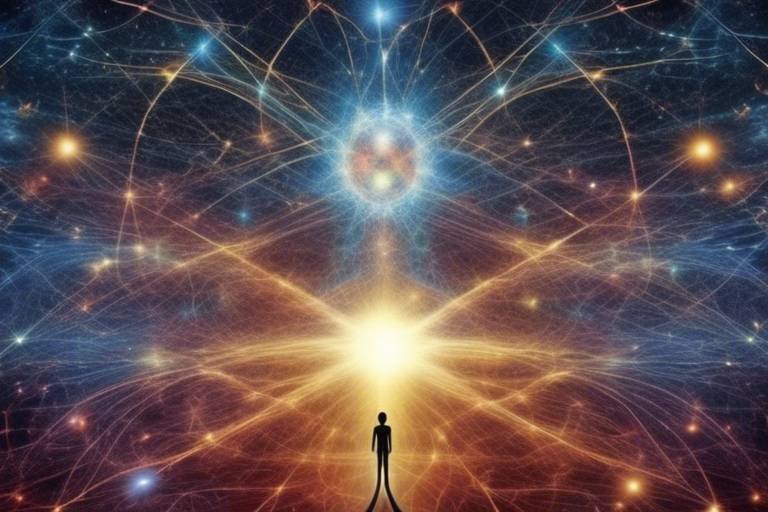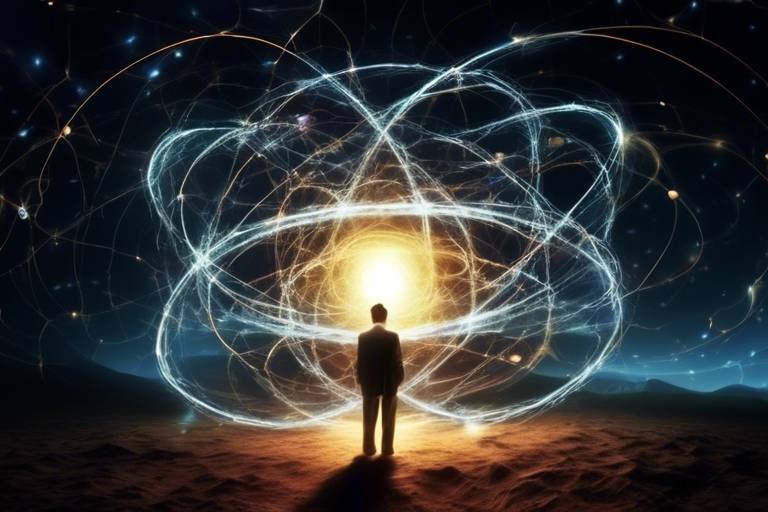The Role of Philosophy in Understanding Thermodynamics
Have you ever found yourself pondering the nature of heat, energy, and the laws that govern our physical world? If so, you're not alone! The intersection of philosophy and thermodynamics is a fascinating realm where profound questions about existence, energy, and the universe itself collide. This article dives deep into how philosophical inquiry enhances our understanding of thermodynamic principles and their broader implications for both science and society.
At its core, thermodynamics is not just a collection of scientific laws; it’s a gateway to understanding the very fabric of reality. The laws of thermodynamics provide a framework through which we can explore concepts such as energy conservation, heat transfer, and the inevitable trend toward disorder, known as entropy. But what happens when we apply philosophical lenses to these scientific principles? We begin to uncover layers of meaning that can transform our perception of the universe.
For instance, consider the first law of thermodynamics, which states that energy cannot be created or destroyed, only transformed. This law raises philosophical questions about the nature of existence: If energy is eternal, what does that say about our own existence? Are we merely transient forms of energy, destined to change and evolve? Such inquiries compel us to reflect on our place in the cosmos and the implications of energy transformations on our lives.
Furthermore, the second law of thermodynamics introduces the concept of entropy, which suggests that systems naturally progress toward disorder. This notion invites us to contemplate the nature of time and causality. Is time merely a measure of entropy increasing? How does this understanding affect our notions of free will and determinism? These are the kinds of questions that philosophy helps us navigate, providing a rich tapestry of ideas that enhance our comprehension of thermodynamic principles.
In the following sections, we will explore key philosophical foundations of thermodynamics, delve into the contributions of influential philosophers, and examine the philosophical debates surrounding entropy and its implications. By doing so, we will illuminate the ways in which philosophy not only complements but also enriches our understanding of thermodynamics, allowing us to grasp the significance of these scientific laws in a broader context.
- What is thermodynamics?
Thermodynamics is the branch of physics that deals with heat, work, and the forms of energy involved in physical and chemical processes. - How does philosophy relate to thermodynamics?
Philosophy helps us explore the implications of thermodynamic principles, raising questions about existence, time, and our understanding of the universe. - What is entropy?
Entropy is a measure of disorder in a system, and it plays a crucial role in the second law of thermodynamics, which states that the total entropy of an isolated system can never decrease over time. - Why are thought experiments important in thermodynamics?
Thought experiments, like Maxwell's Demon, help illustrate complex concepts in thermodynamics and provoke philosophical discussions about the nature of reality.

Philosophical Foundations of Thermodynamics
To truly grasp the essence of thermodynamics, one must delve into its philosophical foundations. At its core, thermodynamics is not just a collection of laws and equations; it represents a profound inquiry into the nature of heat, energy, and the fundamental workings of the universe. Philosophers have long pondered the deeper meanings of these concepts, challenging us to consider not only the mechanics of physical systems but also their broader implications for existence and reality.
When we talk about heat and energy, we're not merely discussing physical phenomena. We are engaging with concepts that have shaped our understanding of the universe. For instance, the notion of energy conservation is not just a scientific principle; it invites philosophical questions about the nature of existence itself. Is energy an intrinsic property of matter, or is it a more abstract concept that reflects our understanding of change and transformation? These questions lead to a rich tapestry of inquiry that intertwines science with philosophy.
Moreover, the laws of thermodynamics serve as a foundation for understanding the universe's behavior. The first law of thermodynamics, which states that energy cannot be created or destroyed, challenges our intuitive notions about creation and existence. It compels us to think about the universe as a closed system where transformations occur but nothing is ever truly lost. This idea echoes through various philosophical doctrines, inviting us to reflect on the nature of reality and our place within it.
In exploring these philosophical dimensions, we can also consider the second law of thermodynamics, which introduces the concept of entropy. Entropy, often associated with disorder, raises profound questions about the directionality of time and the fate of the universe. As systems evolve towards greater entropy, we are led to ponder whether the universe is destined for chaos or if there exists an underlying order that we have yet to comprehend. This interplay between order and disorder is not merely a scientific observation; it resonates deeply with philosophical inquiries about meaning, purpose, and the nature of reality.
To further illustrate these philosophical foundations, we can examine how different philosophical perspectives interpret thermodynamic principles. For example, a materialist perspective might view energy and heat as fundamental components of physical reality, while a dualistic perspective might argue for a distinction between the physical and the metaphysical. These varying interpretations highlight the richness of philosophical thought in relation to thermodynamics and encourage us to engage with these ideas critically.
Ultimately, the intersection of philosophy and thermodynamics invites us to reflect on the nature of science itself. As we grapple with the implications of thermodynamic laws, we are also challenged to reconsider our understanding of scientific inquiry, the nature of laws, and the role of observation in shaping our knowledge of the universe. The philosophical foundations of thermodynamics thus serve not only to deepen our understanding of heat and energy but also to enrich our overall comprehension of the world around us.
- What is thermodynamics? Thermodynamics is the branch of physics that deals with heat, work, and energy transfer in physical systems.
- How does philosophy relate to thermodynamics? Philosophy examines the foundational concepts and implications of thermodynamics, exploring questions about existence, reality, and the nature of scientific inquiry.
- What is entropy? Entropy is a measure of disorder in a system and plays a crucial role in the second law of thermodynamics, which states that the total entropy of an isolated system can never decrease over time.
- Why is the second law of thermodynamics significant? The second law has profound implications for understanding the direction of time, the fate of the universe, and concepts of order and disorder.

Key Philosophers in Thermodynamics
When we delve into the fascinating world of thermodynamics, it's impossible to ignore the profound contributions made by several key philosophers. These thinkers not only shaped the scientific landscape but also infused their philosophical insights into the very fabric of thermodynamic theory. Let's take a closer look at some of these influential figures, starting with Sadi Carnot.
Sadi Carnot, often hailed as the father of thermodynamics, introduced the concept of the heat engine in his seminal work, "Reflections on the Motive Power of Fire." His philosophical inquiry into the efficiency of heat engines laid the groundwork for the second law of thermodynamics. Carnot's ideas emphasized the importance of reversible processes, which not only revolutionized engineering but also sparked philosophical debates about the nature of energy and work. In essence, his work invites us to ponder: how can we harness nature's forces while respecting its inherent limitations?
Next, we have Rudolf Clausius, who further developed the ideas introduced by Carnot. Clausius gave us the concept of entropy, a term that has since become synonymous with disorder and the direction of energy flow. His famous statement, "The energy of the universe is constant; the entropy of the universe tends to a maximum," opens up a Pandora's box of philosophical questions. If entropy is a measure of disorder, what does that mean for our understanding of order, chaos, and the very nature of existence? Clausius's work challenges us to rethink our assumptions about the universe and our place within it.
Another pivotal figure is Ludwig Boltzmann, whose statistical interpretation of thermodynamics bridged the gap between macroscopic phenomena and microscopic behavior. He introduced the idea that the properties of gases could be understood through the behavior of individual molecules. This not only provided a deeper understanding of thermodynamic principles but also raised philosophical questions about determinism and randomness. If the universe is fundamentally probabilistic, what does that mean for concepts like free will and predictability? Boltzmann's insights compel us to reflect on the nature of reality itself.
These philosophers, along with many others, have shaped the discourse surrounding thermodynamics. Their contributions highlight the intricate relationship between science and philosophy, showing that understanding thermodynamic principles is not just about equations and laws; it's also about grappling with the profound implications these concepts have on our worldview. As we explore these ideas, we are led to consider how thermodynamics influences not only scientific thought but also our understanding of life, existence, and the universe.
In summary, the contributions of Carnot, Clausius, and Boltzmann serve as a reminder that the study of thermodynamics is as much a philosophical endeavor as it is a scientific one. Their ideas challenge us to think critically about the principles that govern our universe and encourage us to explore the deeper meanings behind the laws of nature.
- What is the significance of entropy in thermodynamics?
Entropy is a measure of disorder within a system, and it plays a crucial role in determining the direction of energy transfer and the efficiency of heat engines. - How did Sadi Carnot contribute to thermodynamics?
Carnot is known for formulating the concept of the heat engine and establishing the foundation for the second law of thermodynamics. - What philosophical questions arise from thermodynamic principles?
Thermodynamics raises questions about determinism, the nature of time, and the relationship between order and chaos in the universe.

Entropy and Its Philosophical Implications
When we think about entropy, we often picture it as a measure of disorder or randomness in a system. But what does this really mean? In the realm of thermodynamics, entropy is more than just a scientific concept; it carries profound philosophical implications that can reshape our understanding of the universe. At its core, entropy challenges our perceptions of order and chaos, prompting us to ask questions about the very nature of existence.
Imagine a tidy room that gradually becomes cluttered over time. This is a simple analogy for entropy in action. Just as that room tends to become disordered, so too do physical systems in the universe. The second law of thermodynamics states that in an isolated system, entropy will always increase, leading us to consider the implications of this inexorable trend. If everything tends toward disorder, what does that say about our attempts to impose order in our lives? Are we fighting a losing battle against the natural flow of the universe?
One of the most fascinating aspects of entropy is its relationship with the concept of time. Entropy gives us a directionality to time, often referred to as time's arrow. This notion suggests that as time progresses, entropy increases, leading to a future that is more disordered than the past. This raises profound questions: Is time itself a construct shaped by our experiences of increasing entropy? Or is it a fundamental aspect of the universe that we must accept? The philosophical implications of these questions are vast and complex, inviting us to reconsider our understanding of reality.
Furthermore, entropy challenges our notions of determinism and free will. If the universe is constantly moving towards greater disorder, can we truly claim to have control over our lives? Are our choices merely illusions in a cosmos that is destined to become increasingly chaotic? These questions have sparked debates among philosophers and scientists alike, as they ponder the balance between order and chaos in both the universe and human existence.
To illustrate the philosophical implications of entropy, consider the following table that summarizes key aspects:
| Aspect | Implication |
|---|---|
| Nature of Time | Entropy provides a directionality to time, suggesting a past of lower entropy and a future of higher entropy. |
| Order vs. Disorder | Entropy challenges our attempts to impose order, indicating that disorder is the natural state of the universe. |
| Determinism | Increasing entropy raises questions about the nature of free will and whether our choices matter in an entropic universe. |
In conclusion, entropy is not merely a scientific term; it is a gateway to profound philosophical inquiries. It pushes us to explore the nature of time, the struggle between order and chaos, and the very essence of our existence. As we delve deeper into the implications of entropy, we find ourselves at the intersection of science and philosophy, where questions abound and answers remain elusive. It is this dance between the known and the unknown that makes the study of entropy so captivating.
- What is entropy in simple terms? Entropy is a measure of disorder or randomness in a system, indicating how much energy is unavailable for doing work.
- How does entropy relate to time? Entropy gives a direction to time, suggesting that as time progresses, systems tend to become more disordered.
- What are the philosophical implications of entropy? Entropy raises questions about the nature of reality, free will, and the inevitable chaos of the universe.

Entropy in Everyday Life
When we think about entropy, we often picture a complex equation scribbled on a blackboard, but the truth is that this concept permeates our daily lives in ways we might not even realize. Imagine waking up in the morning to find your bedroom in disarray—clothes on the floor, books scattered everywhere. This chaotic scene is a perfect example of entropy at work. Just as the universe tends to move towards disorder, our personal spaces reflect this tendency. The more we neglect organization, the more entropy increases, illustrating that maintaining order requires effort and energy.
Every time you cook a meal, you're witnessing entropy in action. When you chop vegetables, mix ingredients, and heat them, you're transforming ordered components into a more chaotic state—think of how ingredients blend together to form a delicious soup. While the soup is a more complex mixture than the individual ingredients, it embodies the principle of entropy because it represents a higher level of disorder. This process is not just limited to cooking; it extends to various aspects of our lives, including relationships, work, and even our thoughts.
Let’s consider the workplace. Projects often start with a clear structure and defined goals. However, as time progresses, without proper management, tasks can become disorganized, deadlines may be missed, and confusion can reign. This scenario mirrors the concept of entropy, where the initial order degrades into chaos if not actively maintained. Just as a physical system requires energy to reverse entropy, so too does a team require effort and communication to restore order and clarity.
Moreover, entropy isn't just a scientific principle; it's a philosophical lens through which we can view our lives. It prompts us to ask questions like: How do we maintain balance in our environments? What steps can we take to counteract the natural drift towards disorder? By understanding entropy, we can become more proactive in our daily routines, whether it’s organizing our homes, managing our time, or nurturing our relationships. It becomes a call to action, urging us to invest energy in creating and preserving order in our lives.
In essence, entropy reminds us that while disorder is a natural state of the universe, we have the power to impose structure and meaning. By acknowledging the role of entropy in our everyday experiences, we can better appreciate the effort involved in maintaining balance and harmony. So, the next time you find yourself in a messy room or a chaotic project, remember: it's just entropy doing its thing, and with a little energy and intention, you can restore order and clarity.

Philosophical Debates on Entropy
When we dive into the world of entropy, we find ourselves not just in the realm of physics, but in a rich tapestry of philosophical debates that challenge our understanding of the universe. Entropy, often described as a measure of disorder, raises profound questions about the nature of reality, the flow of time, and even the concept of free will. At its core, the debate revolves around how we interpret entropy: is it merely a physical phenomenon, or does it have deeper implications for our understanding of existence itself?
One of the most intriguing aspects of these debates is the relationship between entropy and the arrow of time. As we observe the world around us, it seems that time flows in one direction—from past to future. This notion is closely tied to the second law of thermodynamics, which states that in an isolated system, entropy tends to increase. But what does this mean for our understanding of time? Some philosophers argue that if entropy is a fundamental aspect of the universe, then time itself must be intrinsically linked to the increase of disorder. This raises the question: Is time merely a construct of human perception, or is it a fundamental aspect of the universe that exists independently of our understanding?
Moreover, the implications of entropy extend into the realm of determinism and free will. If the universe is governed by the laws of thermodynamics, and if entropy is always increasing, then does this imply that our choices are predetermined? Are we simply following a path laid out by the laws of physics, or do we have the ability to influence our own destinies? These questions have sparked lively discussions among philosophers, scientists, and theorists alike.
To illustrate these debates, consider the following key points:
- Entropy and Time: Does the increase of entropy define the direction of time, or is time a separate entity?
- Determinism vs. Free Will: If entropy governs the universe, what does that mean for our ability to make choices?
- Interpretations of Entropy: Are there alternative interpretations of entropy that challenge traditional views?
As we ponder these questions, we also encounter various interpretations of entropy itself. Some philosophers argue that entropy should be understood in a more nuanced way, suggesting that it is not just about disorder, but also about the potential for organization and complexity. This perspective opens up new avenues for understanding how systems evolve over time and how life itself emerges from the chaos of the universe.
In conclusion, the philosophical debates surrounding entropy are far from settled. They invite us to explore not only the physical laws that govern our universe but also the deeper implications of those laws for our understanding of existence, time, and free will. As we continue to grapple with these questions, we gain not only a greater appreciation for the complexities of thermodynamics but also a richer understanding of our place within the cosmos.
- What is entropy? Entropy is a measure of disorder or randomness in a system, and it plays a crucial role in the second law of thermodynamics.
- How does entropy relate to time? Entropy is often linked to the direction of time, as it tends to increase in isolated systems, suggesting a flow from order to disorder.
- Does entropy challenge the concept of free will? The relationship between entropy and determinism raises questions about whether our choices are influenced by physical laws or if we possess true free will.
- Why is entropy important in philosophy? Entropy invites philosophical inquiry into fundamental concepts such as time, existence, and the nature of reality itself.

Thermodynamics and the Philosophy of Science
When we dive into the world of thermodynamics, we're not merely exploring a set of equations or scientific laws; we're engaging in a profound philosophical inquiry that challenges our understanding of reality itself. At its core, thermodynamics deals with the principles governing heat, energy, and work, but it also raises critical questions about the nature of scientific knowledge. For instance, how do we know what we know about the universe? Is our understanding of thermodynamic laws a reflection of reality, or merely a model that helps us navigate our experiences?
One of the most intriguing aspects of thermodynamics is its impact on the philosophy of science, particularly in the realm of scientific realism. This philosophical stance posits that the universe exists independently of our observations and that scientific theories aim to describe that reality. However, thermodynamics introduces complexities that challenge this perspective. For example, the concept of irreversibility in thermodynamic processes implies that certain events cannot be undone, which raises questions about the predictability and determinism of scientific laws. If the universe is subject to irreversible processes, can we truly claim to understand it fully?
Moreover, thermodynamics has implications for the concept of theory change in science. The evolution of thermodynamic theory—from the early ideas of heat as a fluid (caloric theory) to the modern understanding of energy conservation—illustrates how scientific knowledge is not static. This continual evolution begs the question: Are our current theories about thermodynamics the final word, or will future discoveries lead us to radically different understandings? In this context, the philosophy of science must grapple with the dynamic nature of knowledge and the inherent limitations of human understanding.
Furthermore, the nature of scientific laws is also called into question by thermodynamic principles. Traditionally, scientific laws have been viewed as universal truths that govern natural phenomena. However, the probabilistic nature of thermodynamics, especially in statistical mechanics, suggests that laws may not be as absolute as we once thought. This realization can be a bit unsettling—if the laws of thermodynamics are probabilistic rather than deterministic, how do we reconcile this with our everyday experiences where we perceive cause and effect as concrete?
To illustrate these points, let’s consider a few key philosophical questions that arise from thermodynamics:
- What does it mean for a scientific theory to be true if it is subject to change?
- Can we ever achieve a complete understanding of thermodynamic laws, or are we limited by our perceptual and cognitive frameworks?
- How do irreversible processes affect our understanding of time and causality?
In conclusion, the intersection of thermodynamics and the philosophy of science opens up a rich tapestry of inquiry that challenges our foundational beliefs about knowledge, reality, and the universe. As we continue to explore these themes, we not only deepen our understanding of thermodynamics itself but also engage in a broader conversation about the nature of scientific inquiry and the limitations of human perception. This ongoing dialogue is essential, as it reminds us that science is not just a collection of facts, but a dynamic process of discovery that reflects our quest to understand the universe.
- What is the significance of thermodynamics in scientific inquiry?
Thermodynamics is crucial because it provides fundamental principles that govern energy transfer and transformation, influencing various scientific fields, including physics, chemistry, and engineering. - How does the concept of entropy relate to philosophical discussions?
Entropy raises questions about disorder, time, and the ultimate fate of the universe, prompting philosophical debates about determinism and free will. - What role do thought experiments play in understanding thermodynamics?
Thought experiments, like Maxwell's Demon, are essential for exploring complex ideas in thermodynamics, allowing us to visualize and question established principles.

The Second Law of Thermodynamics
The Second Law of Thermodynamics is not just a scientific principle; it is a profound statement about the nature of our universe. At its core, this law asserts that in any energy transfer or transformation, the total entropy of an isolated system can never decrease over time. Instead, it tends to increase, leading to the idea that energy will naturally disperse and systems will move towards disorder. This is often summarized by the phrase "entropy always increases," and it raises fascinating philosophical questions about causality, the arrow of time, and even the fate of the universe itself.
To understand the implications of the Second Law, one must first grasp what entropy really signifies. Entropy can be thought of as a measure of disorder or randomness within a system. Imagine a tidy room filled with neatly arranged books and toys. Over time, as people move about and interact with these objects, the room becomes messier. This increase in disorder reflects the natural tendency of systems to evolve towards states of higher entropy. In the context of thermodynamics, this means that energy transformations are inherently inefficient, as some energy is always 'lost' to disorder.
The philosophical ramifications of this law extend far beyond the realm of physics. For instance, it challenges our traditional notions of causality. If every process leads to increased entropy, does that imply that the universe is destined to become more disordered over time? What does that mean for the concept of free will, where our choices might seem to create order out of chaos? These questions provoke deep reflection about our place in the cosmos and the nature of existence itself.
Moreover, the Second Law introduces a fascinating concept known as "time's arrow." This idea suggests that time has a direction—specifically, from order to disorder. In a universe where entropy governs the flow of energy, the past is characterized by lower entropy, and the future is marked by increasing chaos. This perspective reshapes our understanding of time, making it not just a linear progression but a journey towards inevitable disorder.
As we delve deeper into the implications of the Second Law, we must also consider its impact on cosmology. The fate of the universe is a topic of intense debate among scientists and philosophers alike. Will the universe continue to expand forever, leading to a state of maximum entropy known as the "heat death," where all energy is evenly distributed, and no work can be done? Or could there be a cyclical nature to the universe, where it experiences phases of order and disorder? These questions highlight the interplay between thermodynamics and the grand narrative of cosmic evolution.
In addition, thought experiments, such as Maxwell's Demon, play a critical role in illustrating the complexities of the Second Law. This hypothetical scenario involves a tiny being that can sort particles based on their energy levels, seemingly defying the Second Law by creating order from disorder. Such thought experiments challenge our understanding and invite us to reconsider the foundational principles of thermodynamics, sparking lively philosophical debates about the nature of reality.
In conclusion, the Second Law of Thermodynamics is more than a mere scientific principle; it is a gateway to profound philosophical inquiry. It forces us to confront the nature of time, disorder, and our role in the universe. As we continue to explore these ideas, we not only deepen our understanding of thermodynamics but also enrich our comprehension of existence itself.
- What is the Second Law of Thermodynamics?
The Second Law states that in an isolated system, the total entropy can never decrease over time, leading to increased disorder. - How does the Second Law relate to everyday life?
It explains why things tend to become messier over time and why energy transformations are never 100% efficient. - What are the philosophical implications of the Second Law?
It raises questions about causality, free will, and the nature of time, suggesting a universe that naturally progresses towards disorder. - What is 'time's arrow'?
Time's arrow refers to the one-way direction of time from order to disorder, as dictated by the increase of entropy. - How does the Second Law affect cosmological theories?
It influences ideas about the fate of the universe, including concepts like heat death and cosmic evolution.

Implications for Cosmology
The relationship between thermodynamics and cosmology is a fascinating one, as it weaves together the fabric of the universe with the laws of energy and heat. At the heart of this connection lies the Second Law of Thermodynamics, which states that the total entropy of an isolated system can never decrease over time. This principle has profound implications for our understanding of the universe's fate. Imagine the universe as a grand clockwork mechanism, where each gear represents a different celestial body, and the energy flowing through it is the ticking of time. As this mechanism unwinds, it inevitably moves towards a state of maximum entropy, often referred to as the 'heat death' of the universe.
In cosmology, this concept raises some intriguing questions. For instance, if the universe is expanding and cooling, what does that mean for the future of galaxies and stars? Will they eventually fade into obscurity, becoming mere whispers of their former brilliance? The implications of thermodynamics suggest that as energy becomes more evenly distributed, the complexity of structures, such as stars and galaxies, will diminish, leading to a more homogenous universe. This transition from order to disorder can be likened to letting a well-organized room descend into chaos; over time, without energy input or organization, everything tends to settle into a state of disarray.
Moreover, the interplay between thermodynamics and cosmology extends to the notion of cosmic evolution. The Big Bang theory posits that the universe began in a highly ordered state, teeming with energy. As it expanded, the laws of thermodynamics began to shape its trajectory. For instance, the formation of stars and galaxies was a process driven by gravitational forces, which are closely tied to energy dynamics. As stars burn their fuel and eventually die, they contribute to the cosmic soup, enriching the universe with heavier elements through supernovae. This cycle of birth and death echoes the thermodynamic principles of energy transformation and entropy.
To visualize these concepts, consider the following table that summarizes the key stages of cosmic evolution through the lens of thermodynamics:
| Cosmic Stage | Thermodynamic Principle | Entropy Change |
|---|---|---|
| Big Bang | High energy density | Low entropy |
| Formation of Stars | Gravitational collapse | Decrease in entropy (localized) |
| Stellar Evolution | Nuclear fusion | Increase in entropy (energy release) |
| Heat Death | Energy equilibrium | Maximum entropy |
As we delve deeper into the cosmos, we encounter the philosophical implications of these thermodynamic principles. They challenge our understanding of time and causality. If the universe is destined for a state of maximum entropy, what does that mean for the concept of time's arrow? Traditionally, we perceive time as a linear progression from past to future, but in a universe approaching thermal equilibrium, this notion becomes murky. Time may not flow in a straightforward manner but rather reflect a complex interplay of entropy and energy distribution.
In conclusion, the implications of thermodynamics for cosmology are not merely theoretical but resonate deeply with our understanding of the universe's past, present, and future. They compel us to reconsider our place within this vast expanse and the nature of existence itself. As we explore these cosmic questions, we find ourselves at the intersection of science and philosophy, where the mysteries of the universe continue to unfold.
- What is the Second Law of Thermodynamics? The Second Law states that in an isolated system, entropy will always increase over time, leading to a state of disorder.
- How does entropy relate to the universe's fate? As entropy increases, the universe is expected to reach a state of 'heat death,' where energy is uniformly distributed and no work can be extracted from it.
- What role do stars play in cosmic evolution? Stars contribute to the complexity of the universe by forming heavier elements and influencing cosmic structures through their life cycles.
- How does thermodynamics challenge our understanding of time? The approach to maximum entropy raises questions about the linearity of time and whether it truly flows in one direction.

The Role of Thought Experiments
Thought experiments are fascinating intellectual exercises that allow us to explore complex ideas without the constraints of physical experimentation. They serve as a bridge between abstract philosophical concepts and the tangible world of thermodynamics. Imagine trying to understand the behavior of a gas in a closed container; instead of conducting numerous experiments, we can envision scenarios in our minds, manipulating variables to see what happens. This mental simulation not only enhances our understanding but also reveals the underlying principles governing thermodynamic systems.
One of the most famous thought experiments in thermodynamics is Maxwell's Demon. This hypothetical creature, proposed by James Clerk Maxwell in 1867, challenges the second law of thermodynamics by seemingly allowing for the creation of order from disorder. Picture a box divided into two parts, filled with gas molecules. The demon watches the molecules and opens a door to allow only fast-moving molecules to pass into one compartment and slow-moving ones into the other. At first glance, it seems like the demon is creating a temperature difference, thus violating the second law, which states that the total entropy of an isolated system can never decrease over time. This thought experiment not only sparks debate about the nature of entropy but also raises profound questions about information, energy, and the limits of our understanding of the universe.
Thought experiments like Maxwell's Demon highlight the philosophical implications of thermodynamic laws. They force us to confront the boundaries of physical laws and challenge our assumptions about reality. For instance, they prompt us to ask: What is the role of information in physical processes? Is it possible to define a system's entropy without considering the information that describes it? These inquiries lead to a deeper exploration of the relationship between thermodynamics and information theory, revealing how intertwined these concepts are.
Moreover, thought experiments serve as educational tools, helping students and enthusiasts grasp complex ideas in a more accessible way. By visualizing scenarios, learners can develop a more intuitive understanding of thermodynamic principles. They can ponder questions like, How does energy transfer occur in a system? or What happens to energy when it is transformed from one form to another? These questions are not merely academic; they resonate with our daily experiences, making the abstract more relatable.
In essence, thought experiments are not just quirky mental exercises; they are essential for philosophical inquiry and scientific understanding. They allow us to navigate the intricate landscape of thermodynamics, revealing connections between seemingly disparate concepts. As we delve into these mental models, we not only enhance our comprehension of thermodynamic principles but also enrich our philosophical perspectives on the nature of reality itself.
- What is a thought experiment? A thought experiment is an imaginative scenario used to explore the implications of theories or concepts without physical experimentation.
- How does Maxwell's Demon challenge thermodynamics? It suggests that it is possible to decrease entropy by sorting particles, seemingly violating the second law of thermodynamics.
- Why are thought experiments important in science? They help clarify complex ideas, stimulate philosophical discussions, and provide insight into the principles governing scientific laws.
- Can thought experiments change scientific understanding? Yes, they can lead to new hypotheses and theories by challenging existing paradigms and encouraging innovative thinking.
Frequently Asked Questions
- What is the relationship between philosophy and thermodynamics?
Philosophy and thermodynamics are intertwined in ways that help us grasp the deeper meanings of energy, heat, and the laws governing physical systems. Philosophical inquiry challenges us to think critically about the implications of thermodynamic principles, enhancing our understanding of both science and the world around us.
- Who are some key philosophers associated with thermodynamics?
Prominent figures like Sadi Carnot, Rudolf Clausius, and Ludwig Boltzmann have made significant contributions to thermodynamic theory. Their work not only advanced scientific understanding but also raised important philosophical questions about the nature of heat, energy, and the universe itself.
- What is entropy, and why is it important?
Entropy is a measure of disorder or randomness in a system, and it plays a crucial role in thermodynamics. It raises fascinating philosophical questions about the nature of time, the direction of processes, and even the ultimate fate of the universe, making it a key concept in both science and philosophy.
- How does entropy affect our everyday lives?
Entropy isn't just a theoretical concept; it influences our daily experiences and decision-making. For example, the tendency for things to become more disordered over time can be seen in everything from household chores to the aging process, reminding us that change is a constant part of life.
- What are some philosophical debates surrounding entropy?
There are ongoing discussions about how entropy relates to determinism and free will. Some argue that the increase of entropy points to a predetermined universe, while others contend that it allows for randomness and choice, highlighting the complexity of our existence.
- How does thermodynamics challenge traditional views in the philosophy of science?
Thermodynamics questions conventional ideas about scientific realism and the nature of scientific laws. The principles of thermodynamics illustrate how theories can evolve and change, prompting us to reconsider what we understand about the scientific method and the nature of truth in science.
- What is the Second Law of Thermodynamics?
The Second Law states that in an isolated system, entropy tends to increase, leading to irreversibility in natural processes. This has profound philosophical implications, particularly concerning causality and the arrow of time, which influences how we perceive change and existence.
- How do thermodynamic principles relate to cosmology?
Thermodynamics plays a pivotal role in cosmological theories, particularly regarding the fate of the universe. Concepts like entropy help us understand cosmic evolution and the potential future states of the universe, bridging the gap between physics and philosophical inquiry.
- What are thought experiments in thermodynamics?
Thought experiments, such as Maxwell's Demon, are hypothetical scenarios that challenge our understanding of thermodynamic principles. They serve as powerful tools in philosophy and science, prompting us to think critically about complex concepts and their implications.



















